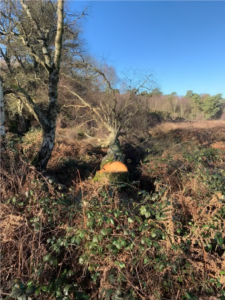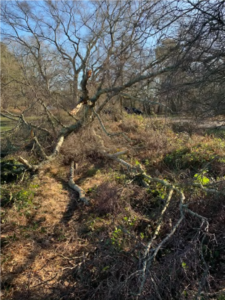East Sussex body fined as dog walkers struck by tree
A body that manages a major forest in East Sussex has been fined after a husband and wife were struck by a tree, with the latter suffering a traumatic brain injury.
Caroline Leafe, 70, was walking along a deer track in Ashdown Forest with her husband, Kenneth, and their dog, Monty, when the pair were hit by a silver birch tree that was being felled on 25 January 2023.
The Conservators of Ashdown Forest, the body that manages Ashdown Forest, had identified that the 12-metre tree was rotting and needed to be cut down.

The tree was located in the corner of Broadstone Car Park on Colemans Hatch Road in Upper Hartfield, East Sussex and surrounded by public footpaths, including the main pathway to the visitor centre.
The tree began to fall after a forest ranger made a sink cut with a chainsaw. As it was falling, the ranger noticed Mr and Mrs Leafe walking on the nearby deer track and attempted to warn them but it was too late.
Mrs Leafe suffered a traumatic brain injury, a fractured collar bone, several fractured ribs and a shoulder dislocation. She spent considerable time in hospital following the incident and continues to undergo physical and cognitive therapy several months later. She also had to surrender her driving licence.

She said in a statement: “I have suffered a loss of independence and Ken has had to do a lot more support to me. I haven’t been able to drive for nearly a year. The head injuries included speech problems and emotional problems.
“There were school children at the forest when we were there and we are relieved that our accident didn’t happen to them. Ken and I hope an incident like this never happens again.”
Mr Leafe suffered cuts and bruising.
A Health and Safety Executive (HSE) investigation found The Conservators of Ashdown Forest failed to identify the risk to members of the public from tree felling. This meant precautions, such as posting warning signs and using barriers and banksmen, were not implemented to prevent members of the public from accessing areas where the tree felling was taking place.

The Conservators of Ashdown Forest pleaded guilty to breaching Section 3(1) of the Health and Safety at Work etc. Act 1974. The trust was fined £8,000 and ordered to pay £3,589.80 in costs at Brighton Magistrates’ Court on 12 August 2024.
HSE principal inspector Emma Stiles said: “Members of the public should be able to enjoy a walk in a forest without fear of being struck by a tree being felled. The guidance is clear on how to fell trees safely and this means keeping members of the public out of an area around the tree measuring two times the height of the tree.
“This can be achieved by various means including signs, barriers and banksmen. Given the high levels of public access around this tree, all of these precautions should have been taken.”
This prosecution was brought by HSE senior enforcement lawyer Nathan Cook and supported by HSE paralegal officer Imogen Isaac.
Notes to editors:
- The Health and Safety Executive (HSE) is Britain’s national regulator for workplace health and safety. We are dedicated to protecting people and places, and helping everyone lead safer and healthier lives.
- More information about the legislation referred to in this case is available.
- Further details on the latest HSE news releases is available.
- HSE does not pass sentences, set guidelines or collect any fines imposed. Relevant sentencing guidelines must be followed unless the court is satisfied that it would be contrary to the interests of justice to do so. The sentencing guidelines for health and safety offences can be found here.
